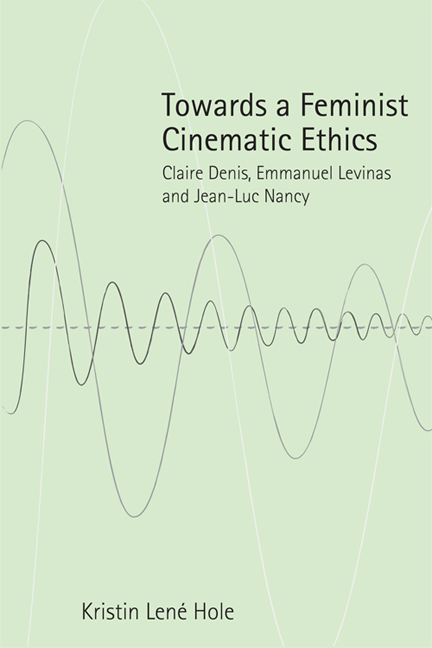Book contents
- Frontmatter
- Contents
- List of Figures
- Acknowledgements
- 1 Encounters, Intrusions: Denis, Levinas, Nancy
- 2 Film Interrupted: Denis, Nancy and an Ethics of Sense
- 3 Otherwise than Hollywood: Denis, Levinas and an Aesthetic of Alterity
- 4 Troubling the Body: Trouble Every Day, Dance and the Non-Mythic Body
- Coda
- Bibliography
- Index
2 - Film Interrupted: Denis, Nancy and an Ethics of Sense
- Frontmatter
- Contents
- List of Figures
- Acknowledgements
- 1 Encounters, Intrusions: Denis, Levinas, Nancy
- 2 Film Interrupted: Denis, Nancy and an Ethics of Sense
- 3 Otherwise than Hollywood: Denis, Levinas and an Aesthetic of Alterity
- 4 Troubling the Body: Trouble Every Day, Dance and the Non-Mythic Body
- Coda
- Bibliography
- Index
Summary
Astudent (Ana Samardzija) and an older man sit across from each other in a train carriage in Claire Denis's short film Vers Nancy. We catch them in mid-conversation, while outside the window the countryside zooms past, too quickly for the eye to get a good hold on (Figures 2.1 and 2.2). The student – whose name indicates Yugoslav heritage and who is therefore probably no stranger to the violence of borders – discusses her foreign status in France. The conversation carries over periodical intercuts to an empty corridor – a liminal space of passage that suggests the possibility of intrusion onto the conversation, and also serves to remind the viewer of the limits of what the image exposes. As the conversation continues, the elderly gentleman initially dominates. He is concerned with the idea of normalising immigrants, insisting rather that something within a foreigner must remain foreign – she must remain an intruder. The student asks who he is addressing – the host or the foreigner?
As they proceed to discuss the state of borders both European and, more specifically, French, the film cuts back to the hallway. A man (Alex Descas, a French-African actor and Denis regular) stands in the previously empty corridor and smokes a cigarette (Figure 2.3). His status is unclear. Is he one of the foreigners the film has been discussing, or is he one of the many formerly colonised subjects who are born and raised in France? Or is he foreign either way, his blackness rendering him forever other to an abstract Frenchness that is implicitly white? His image visually raises the point that the older man has just articulated verbally – even if he is French, this unknown man remains other: ‘the demand to welcome foreigners in a normalising way means we end up ignoring their foreignness. It's like pretending that a black person isn't black.’
When we return to the train carriage, we begin to see closer frames of the faces and hands of the two interlocutors as they talk and listen (Figures 2.4 and 2.5). While the man continues, the student becomes increasingly animated and less self-conscious.
- Type
- Chapter
- Information
- Towards a Feminist Cinematic EthicsClaire Denis, Emmanuel Levinas and Jean-Luc Nancy, pp. 37 - 85Publisher: Edinburgh University PressPrint publication year: 2015



